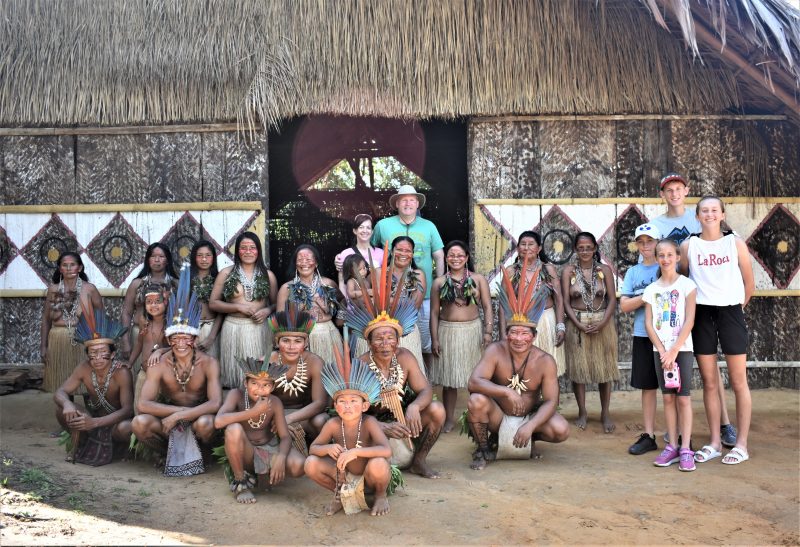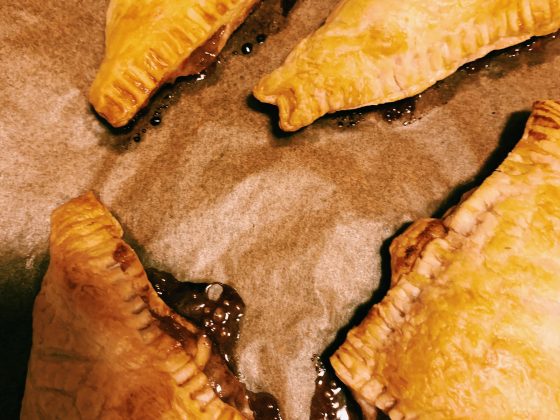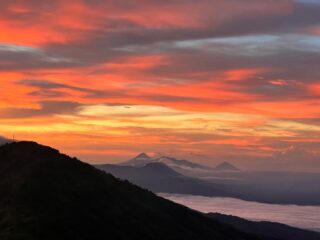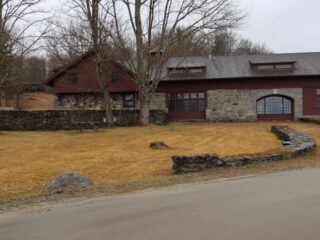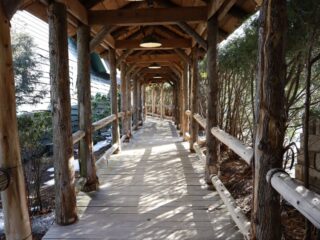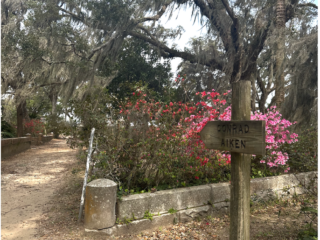By Kristen Hogan
Do you like green eggs and ham?
I do not like them, Sam-I-am.
I do not like green eggs and ham.
It’s hot in the canoe. Sweltering hot like butter in a frying pan. I smell my husband beside me, the sweat seeping out of his skin like a spring thaw. We are on the Amazon River in June and our guide, Sam, maneuvers the motorized canoe into a narrow branch of the river. Thankfully, the trees create a canopy over us, providing shade from the devastating sun. Sam points out a sloth and a monkey in the nearby treetops.
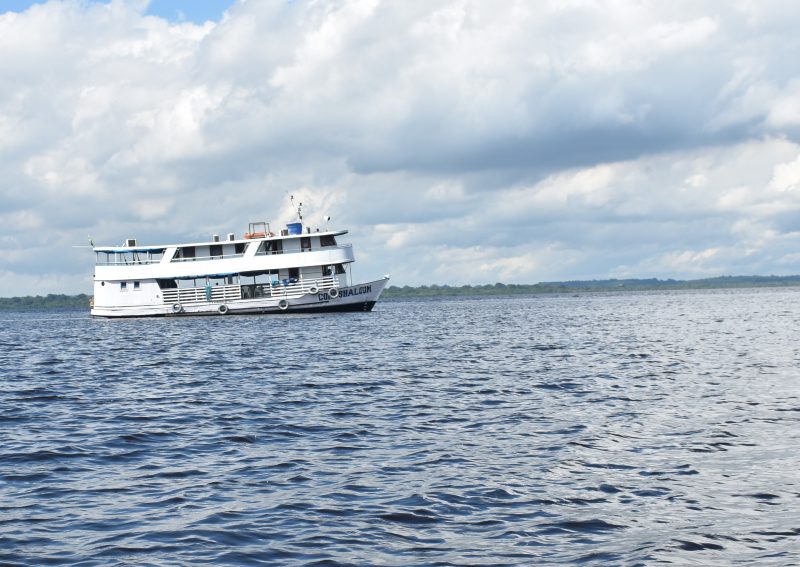
I peer where he points and see nothing but effusive leaves, my eyes not yet acclimatized to the intricate details of the landscape. Without him, we are neither here nor there. We are blind to the swarming life around us.
It’s a miracle we made it to this wonder of the world. Months of planning, passport applications and visas, ever-changing flights and hours on the phone. We do not travel much, opting instead to camp in the mountains of Utah each summer. But this is our last summer together. Next year, our oldest son will be leaving home, and it might never be the six of us again.
Sam guides the canoe into a channel of backwater thick with tendrils of branches and exotic plants. “They don’t swim in the middle of the river,” he said. “They live only in the offshoots where it’s easy to find food. We should be able to catch some here.”
He’s talking about piranhas, the aquatic horror of the rainforest. But Sam nonchalantly slices up raw beef on the seat of the canoe and attaches the meat to bamboo fishing rods. We lower our dangling temptations into the water, and I’m surprised at the speed of our success. The upwards jerking motion must be quick and strong, or they will get away with the food. Sam balance-walks through the boat, helping to dehook the creatures we catch, their freaky underbites forced open by his fingers. We take our pictures and Sam frees them back into the water except for six he saves for our cook, Carla, to fry up for dinner. Eat them! Eat them! She will say.
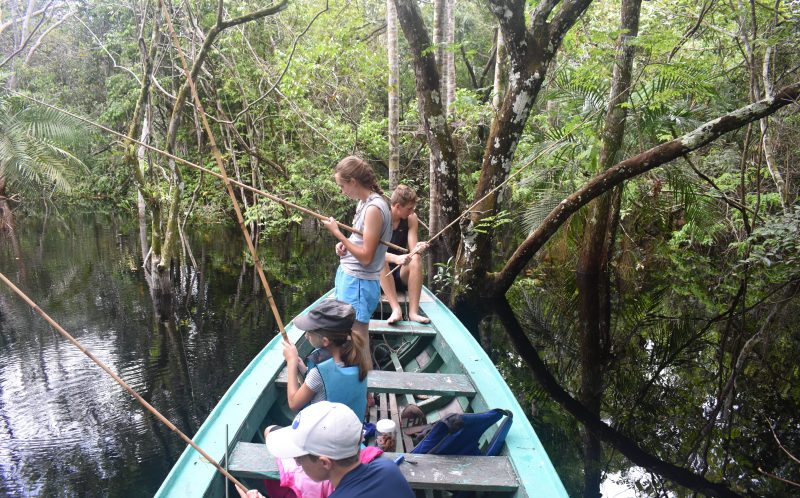
We journey deeper into the twisted tributaries of the river, and I wonder how Samuel will remember the way back. The forest yawns and stretches around our canoe until the trees clot the path forward. Sam entrusts my son with his machete. Drew stands at the bow of the canoe like the Karate Kid and whacks away the kapoks and lianas hindering our path. It’s as though he has done this all his life, his arms crosscutting in front of him, tae kwon do style. He’s opening a fissure in the half-submerged jungle, letting in an untested light.
In a pool of backwater, a disturbance ripples the surface to our right.
“Ah, a beautiful boa,” Sam exclaims. “It just dropped from that palm.”
Our reluctant reflexes miss the plunging creature and all we see is water gray and polished.
“That was a beautiful boa,” Sam repeats.
Beautiful. What a word to describe a feared reptile. But I’m noticing something about Sam. He emulates a reverence for this river that cuts through the forest like a pulsing vein. While we shudder at the prowling snakes, he revels in their glistening, patterned skin. While we cower at the idea of tarantulas amassing in the overhanging branches, Sam would hold one in the palms of his hands like a treasured pet.
Try it! Try it! He urges. Try to taste the tonic in the air.
When we come out of the backwater into an open expanse, a floating island of grass bars our way forward. Backtracking seems our only option, but Sam has other ideas.
“Hold on,” he instructs as he revs up the motor and proceeds to ram the canoe straight into the floating thicket.
“What is he doing?” my husband whispers as we hit the muddy island again.
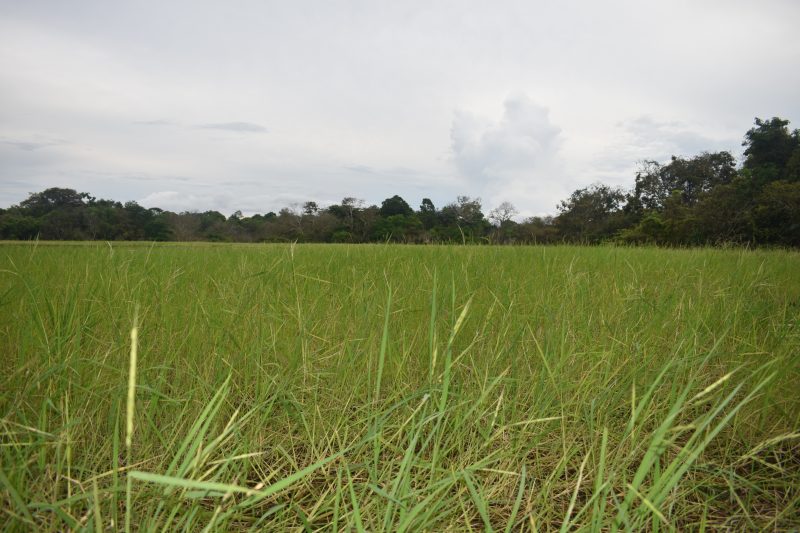
It would seem he plans to break up the floating meadow with the sheer force of our small canoe so we can travel through to the other side. I’m doubting Thomas and Moses at the same time. How will our canoe part this Red Sea? But we have witnessed Sam’s miracles before. He drives the weathered canoe again into the floating island. But instead of a miraculous parting, we become enmeshed in the mud and grass. Sam doesn’t seem all that concerned. He tells us about the time he and his brothers spent three days stuck in a water meadow like this one. They survived on rainwater and fish.
Our Sam. He could live in a box in a tree in the dark in the rain. Just let him be!
Ants swarm our boat from the grasses. I eye the blade-like leaves for spiders, especially the so-called dinosaur spider, measuring thirteen inches across.
Sam reassures us that spiders are harmless creatures, and we should be more concerned about the Amazon wasps. “Too many stings can kill you,” he adds.
Nah, I think. I deal with wasps all the time back home. I do not like spiders anywhere.
Barefoot, Sam moves around the boat, using the paddles to push the canoe free. Drew and Wade fumble to help, teetering like tenderfoots in the wobbly canoe. Twenty minutes later, we break free of the grasping grasses and we head back through the path previously hacked clear by Drew.
As we near the main artery, my youngest son suddenly popcorns in his seat, frantically whacking his arms and legs. Wade joins in the chaotic dance while Kate adds a wail to the cacophony and fumbles at her ponytail. A sting pierces my knuckle. There is fear in Sam’s usually calm face as he guns the canoe forward to a cove of sepia water.
“It’s caught in her hair!” Sam barks at my husband.
Wade fumbles at Kate’s ponytail.
“Kill it,” Sam commands.
Wade smashes the creature and hurls it into the water. Tears leak down Kate’s face, her eyes fading to an ashy blue.
“Amazon wasps?” I question Sam.
He nods. “I saw some monkeys disturbing a nest. We drove right through their escape route.”
From his knapsack, he pulls out homemade salve and rubs the soothing ointment on each of the saffron-colored bumps puckering our skin. He has been stung six times, more than the rest of us combined. The smarting ceases and I once again conclude we might die without him. His eyes are trained to see what we cannot. Yet in all this macrocosm, how does he detect a few monkeys with their paws in a wasps’ nest?
***
The chef stands in his loincloth of leaves with a long-feathered headpiece and welcomes us to his village in his native tongue. We sit like mouses in his house. His weathered face features red markings meaningful to the tribe in some way. All the village men don necklaces of animal teeth on their bare chests. The women are bare chested too with grass skirts and necklaces swaying near their belly buttons. I resist the urge to cover the eyes of my teenage son.
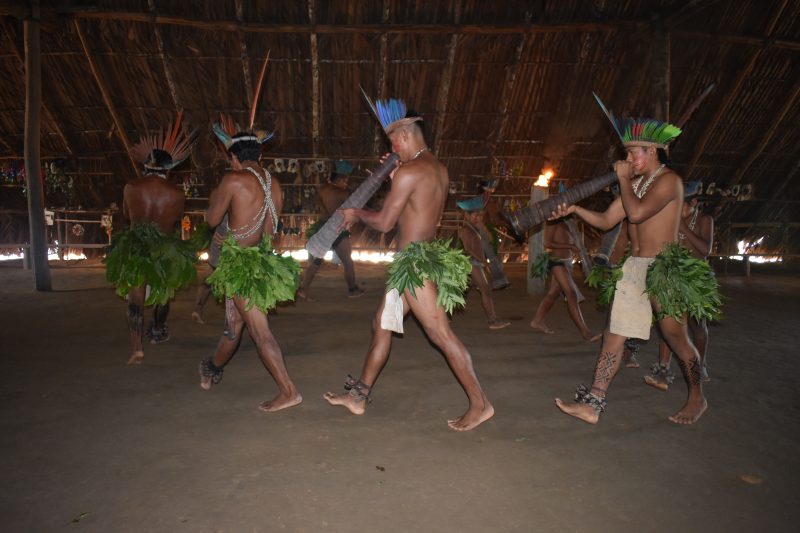
Then they dance, the men hitting decorated poles on the dirt floor while chanting low like a humming. When they begin to move, the rattles on their ankles add to the cacophony. Women join the dance, slipping between their shoulders like intertwining vines. One male voice raises higher in an extended note, calling skyward.
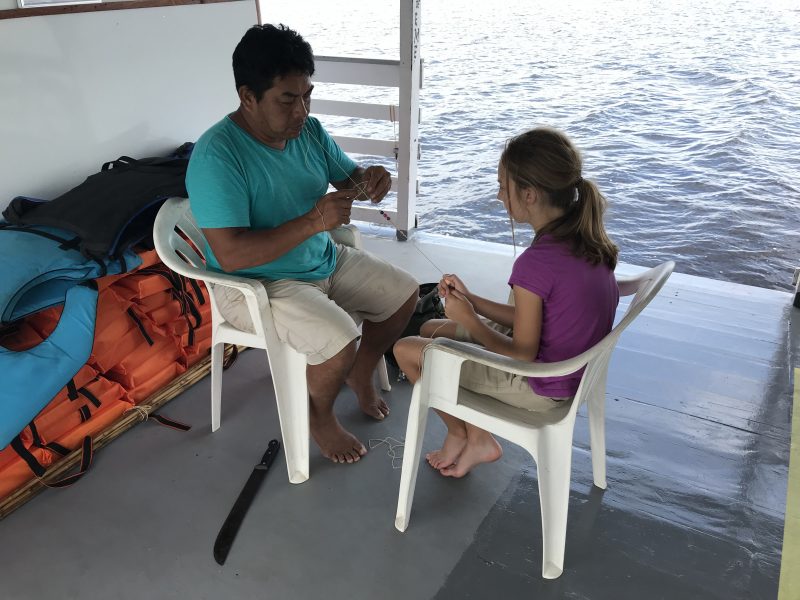
We buy their homemade crafts, the ultimate, authentic souvenirs. Bracelets, dart guns, native rattles, hot pads, and purses from stained and polished wood. A necklace with piranha teeth. In his khaki shorts and Adidas sneakers, Sam laughs with the barefooted, loin-clothed chief on a bench. I envy their unhurried happiness.
Afterwards, we pose for a picture with the group outside their gathering hut. My four towering, pale-faced children in their t-shirts, shorts, and tennis shoes conflict with the scene like shipwrecked aliens from another world.
I zoom in with my camera. Here they are. The people we traveled a great distance to meet. I do like them, Sam-I-Am.
***
Sam instructs us to put on mosquito repellent, wear good shoes, and bring a jacket. “It’s not called the rainforest for nothing.” He laughs.
“Will you be wearing shoes?” I tease.
I lug out my hiking boots from the family suitcase. I’ve anticipated today’s hike through the jungle since the moment I read it on the itinerary.
We lather on the mosquito repellent and jump into the canoe. A mile up a tributary, Sam beaches the canoe and we enter the forest. The way is dense, and I can almost hear the decomposing plants and animals adding their nutrients to the soil. We follow Sam through the trees with the sense that he is keeping us alive. When he stops, we stop. When he scoops up Kate and tells us to skedaddle around an ant nest, we run without question. When he cracks open Brazilian nuts with his machete and hands them over, we munch without protest. Say! I like them, Sam-I-am!
He finally halts in a small clearing. “Okay, this is a good time to apply more repellent.”
We stared back at him. “We didn’t bring any with us,” I venture. “We just sprayed it on really good back at the boat.”
He starts to chuckle. “Oh, that will last you about half an hour out here.” He chuckles again at the look of horror on our faces. “Don’t worry,” he soothes. He once again reaches into the knapsack we have dubbed “Hermoine’s handbag” because of its propensity to hold everything one might possibly need on a trek through the Amazon forest. Sam pulls out a stick with some wax on the end and starts the wax on fire. “Never fear, the smoke will keep the mosquitoes away.”
We huddle around the smoke while Sam slices off pieces of bark from a nearby tree and fashions a bow and arrow. We practice our archery skills at an unfortunate acai. With waxy, pointed leaves, he weaves a hammock. He could survive here or there. He could survive anywhere. He teaches how the natural world reflects our inner world. “The indigenous people here,” he explains, “use the natural world to survive. To them, the place is not dangerous, it provides everything they need.”
But the environment feels hostile to me, especially when I stumble and reach out for the nearest tree for balance and find it covered with cactus spikes that puncture my palm. Later, my hand swells up, hard and tender and dark coral red but Sam assures me not to worry. His face wears no worry wrinkles. He seems ageless, neither old nor young.
***
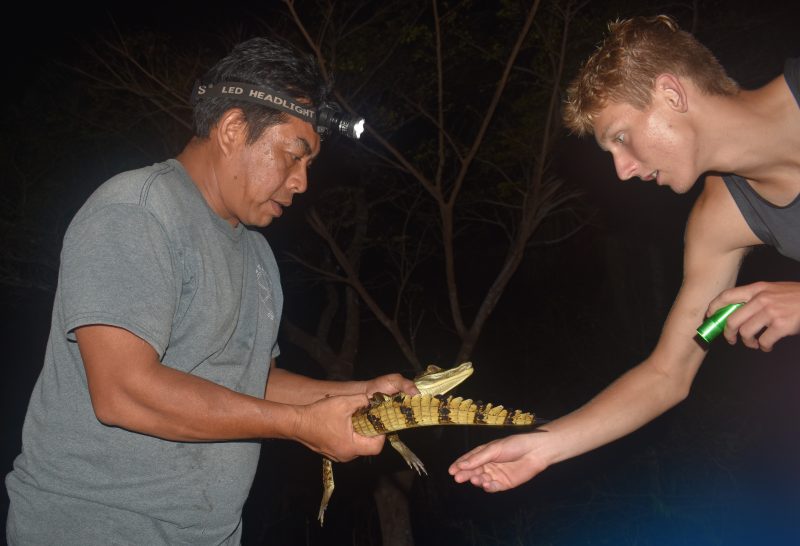
We set out to hunt caiman. Darkness is essential, Sam explains, because during the daylight their camouflage skin hides them from predators and Sam’s keen eyesight. But at night, their eyes will reflect in a flashlight’s glow. Only a few minutes into the hunt, Samuel spots one with his headlamp.
“It’s a baby,” Sam says and points toward the bank. I cannot see anything but the rest of my family gasps. We glide silently forward while Sam slides onto his belly and reaches into a thicket of grass. He pulls the baby alligator from the water.
The dark leathery skin glistens in our flashlights. Sam moves through the canoe, allowing us to touch the skin that is surprisingly coarse and dry. The creature seems calm even when Samuel circles the neck with his forefinger and thumb. “Keeping the safety on,” he jokes. A few minutes later, he lets it go into the swampy waters.
After a few more catches, Sam challenges Drew to try it.
We will try it. You will see.
“Reach out slowly from the side,” he coaxes, as the canoe inches forward. “Hold on. Wait. Let the canoe draw a little closer. Now!”
A second later, Drew holds up a dripping caiman to the light. It’s brown and yellow like a linoleum pattern. We all cheer and Drew flushes with the thrill of the catch. He asks me to take a picture. I’m already zooming in.
We are stalking them now, experienced hunters in the deep dark of the forest. Hoping to call forth an adult creature, Sam produces the mating call of the caiman. Deep, guttural, and hollow, it echoes off the water like an irregular drum. But the only eyes we see are small and infantile. We approach each scene sleuth-like. Now it’s Autumn’s turn. She holds up a black one with tawny polka dots into the limelight of Sam’s torch. The creature stays motionless as we pose for pictures. How does it remain cool as a cucumber in our hands? Autumn slips it back into the shadows of its weedy home.
As the canoe purrs toward the houseboat, the light shining from the stern-shaped kitchen where Carla is still washing dishes becomes a beacon to guide us home. It feels as if I’ve been holding my breath, that soon enough this experience will be over and and the images of the baby caiman, and dancing natives, the rubber trees and the endless water will fade to a sepia shade in my mind.
***
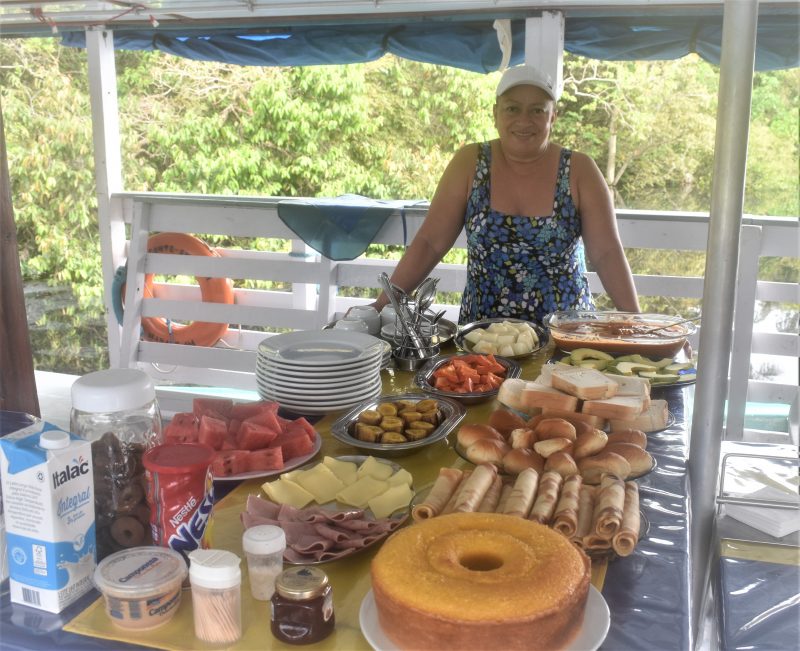
Carla outdoes herself for our last breakfast. Fried bananas, corncake, sausage in red sauce, cheese and meats, thin pancakes rolled up like crepes, chunks of honeydew melon and watermelon, yams and avacados. Unbeknownst to us, Sam siphons several bananas for our final canoe ride.
We glide across the water to a cluster of trees near the bank of the south shore. Sam cuts the engine and starts screeching like a banshee. We shift on the wooden planks, no longer surprised by the commotion, simply waiting for Sam’s communication to bear fruit. Soon enough, he’s calling down the monkeys.
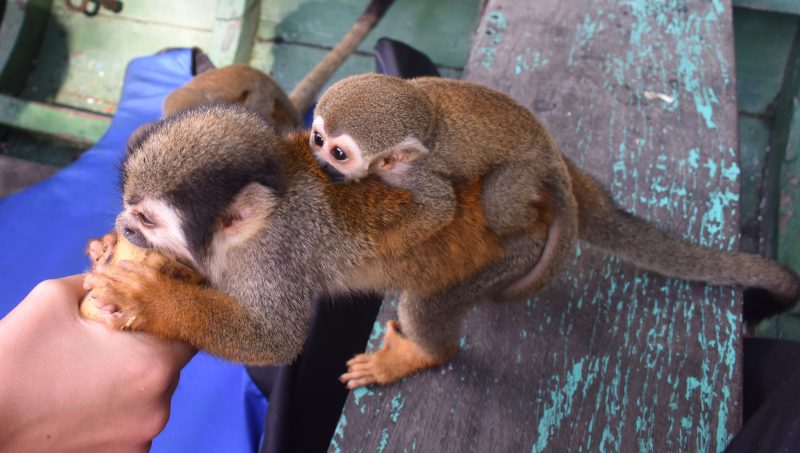
With babies on their backs, the wild monkeys eat bananas right out of our hands, their little paws peeling them as if husking corn. The canoe is swarmed, they crawl up our arms, shoulders, and heads, their beady eyes focused on the food we offer. My children’s eyes glow like sun-rays reflecting off the water. Disneyland cannot hold a candle to this.
All too soon, our supply of bananas runs dry and the frantic chatter fades away into the branches. There is monkey poop on my camera bag but it’s a small price to pay for such close encounters of the monkey kind.
The time arrives to say goodbye. Although we’ve invited Sam to our house in Utah, we most likely will never see him again. He stands barefooted on the street by the van that will take us back to our hotel. I point out his lack of shoes.
“I don’t like shoes,” he says.
For four days, he offered us the wonders of the unknown and unfamiliar. If we fumbled at first and eyed the fare with uncertainty, he tempted us with sloths and woodpeckers, piranhas and pink dolphins, sunsets and swimming, baby caiman and monkeys peeling bananas on our laps. When we feared the obvious creatures, he teased out our prejudices and unearthed the real dangers. And when we stumbled like foreigners, he taught us balance even in a cramped canoe.
In the end, even we, who had paid so much and come so far, were amazed at the deliciousness of his offerings.
We do so like green eggs and ham!
Thank you.
Thank you.
Sam-I-am.
Kristen Hogan’s work has appeared in Segullah Magazine, The Ravin Perch, and on kristenotthogan.com. She co-authored Phoenix Flame, a memoir chronicling her nephew’s battle with mental illness. She currently lives in Syracuse, Utah, with her husband and four children.

